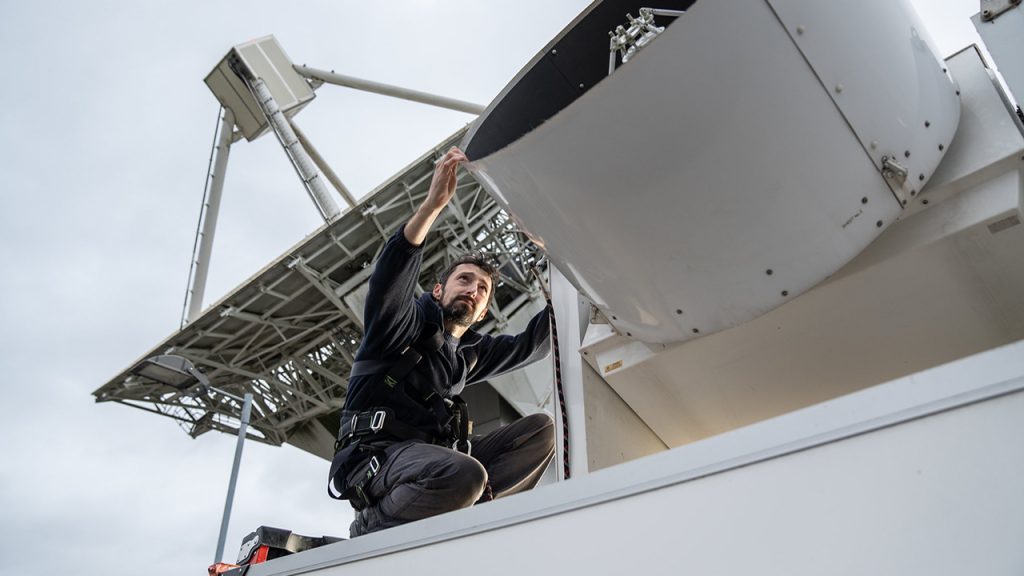
Researchers awarded £1.8m to improve turbulence in weather forecasts
A team of researchers led by the National Centre for Atmospheric Science and the University of Leeds have been awarded £1.8 million to improve forecasts of extreme weather through a novel observational campaign in southern England.
Their campaign, called WOEST, will focus on observing turbulent processes in our atmosphere in order to improve our ability to make high resolution weather forecasts.
It’s hoped that in years to come, and through close partnership with the UK Met Office, their work can help the United Kingdom to manage risks from severe weather more effectively.
At the heart of the WOEST campaign lies a fundamental, and tricky to answer, question about one of the chaotic processes that affects our weather – turbulence.
Turbulence in our atmosphere is best described as chaotic motions of the air, and can cause irregular fluctuations in the wind, temperature, humidity and composition of the atmosphere.
Turbulence – and the chaos it causes – can have important knock-on effects for our weather.
“Turbulence is easy to see in our daily lives, if you look closely at clouds in our sky, you might notice how air swirls in random fluctuations around their edges,” says lead researcher Dr Ryan Neely III, National Centre for Atmospheric Science and University of Leeds.
But, trying to measure turbulence and its impacts on our weather has been a longstanding challenge for researchers.
“How do you quantify chaos?” asks Dr Neely III.
“Our observational campaign sets out to do just that. We have brought together a world-leading team, and state-of-the-art technology to answer a question that has intrigued me since I was a kid,” adds Dr Neely III.
Although turbulence plays a key role in thunderstorms, there have been very few observations dedicated to evaluating turbulence in our skies.
At the moment, our weather models rely heavily on theoretical knowledge to simulate turbulence in our atmosphere, and scientists believe this may be a large source of potential errors in our predictions. For example, when we try to forecast when convective rainfall will start, and how much rain will fall.
To investigate turbulence in our atmosphere, Dr Ryan Neely III will lead a team of scientists on an extensive field campaign throughout the summer months – made possible by the £1.8m funding award from the Natural Environment Research Council.
The team will deploy a series of weather radars, weather balloons, unmanned aerial systems, cloud cameras, and an extensive network of ground based sensors across southern England to build a complete picture of turbulence in our atmosphere.
To maximise their work, they will join forces with the Wessex Convection Experiment, a summer observational campaign led by the UK Met Office.
Their close partnership will allow Dr Ryan Neely III’s team to tap into additional measurements collected by the FAAM Airborne Laboratory over southern England, as well as a network of sensors deployed across the region by the Wessex Convection Experiment.
Together, the two teams will aim to capture real-world data about how turbulence near the Earth’s surface develops over time, and to produce three dimensional estimates of turbulence in convective clouds.
One of the novel approaches pioneered by Dr Ryan Neely III’s team will see two steerable weather radar set-up specifically to track and observe convective clouds at the same time that the FAAM Airborne Laboratory flies overhead through the same clouds.
These weather radar will be powered by HVO fossil-free biofuel diesel generators, instead of diesel fuel sourced from crude oil, which will reduce greenhouse gas emissions by up to 90%.
Researchers will combine observations from every angle to help them describe turbulence in the atmosphere, and ultimately, will use the observations to improve how we predict the weather on a day-to-day basis.
WOEST brings together the National Centre for Atmospheric Science, University of Leeds, University of Reading, University of Manchester, University of Oxford and Imperial College London.
